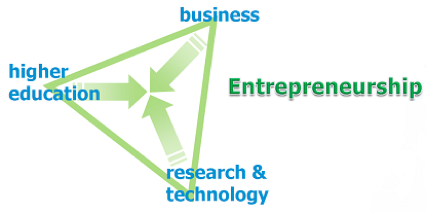…. The best we can do today…is to prepare the future…
e-KNOT stands for European GNSS KNOwledge Triangle…
…The so‑called KNOwledge Triangle refers to the interaction between research, education and industry in Europe which are key drivers able to create innovation, basis of a knowledge-based society. In the European Union this concept has already been highlighted by the development of the Lisbon Strategy .
Integrating the three sides of the « Knowledge Triangle »: higher education, research, and business sectors is the core of the e-KNOT Horizon 2020 Project, leveraging on past activities already undertaken in this field through the G-Train and GENIUS FP7 Projects.
- Education-Industry links consolidated through the placement of students and young researchers, trained on the last mile GNSS technologies in companies, and by providing specialized training to professionals, filling the gap between the education (students) and industry (companies) sides.
- Education-Research by bringing PhDs towards excellence. In order to foster the scientific quality of the research in GNSS for young researchers trough two types of events “PhD training”( Specialized training for GNSS Ph.Ds ) and PhDs “Excellence Weeks”( hosting the best scientific experts )
- Research-Industry by the setting up of “Industry consultancy voucher”s aimed at selecting and supporting innovative start up and “Technology Road Show” aimed at disseminating last technology outcomes
- Cross-layer actions such as measures to develop co-funding PhDs with industry or promoting the existing Satellite navigation University Network.
The e-Knot project is developed by a consortium of qualified institutions with a strong experience in GNSS education, research, cooperation with companies and industrial world.
Dr Fabio Dovis, from Polito(I), coordinator of the Project, participating in a session dedicated to Education at the last Munich Summit (March 2017), mentioned that “Education in general, and not only in GNSS, should not be seen as an isolated activity but as an integral part of the innovation value chain “.He added as well “From a technology point of view GNSS is an essential part of any navigation system but the real keyword is integration with other systems. As for the applications, the knowledge of the position involves several other aspects such as privacy, security, resilience to jamming and other threats, not to mention the market and business part. All these aspects make the education of a “GNSS expert” a quite complex task ! ”
|
The succession of the 4 Projects, ERIG, G-Train, Genius, e-KNOT confirms, if needed, that the European GNSS Agency (GSA) care about the permanence of an effort dedicated to Education. Indeed in the ongoing economical worldwide mutation, Education will be one of the main assets for Europe development. As rightly mentioned by Pr Christophe Macabiau (ENAC-F) at an Education Review “. Nowadays Education will evolve in a complex balance between Cooperation and Competition, and this is valid not only in Europe but worldwide.”
Quoting Reinhard Blasi, Project officer at the Market Development Unit, of the GSA -European GNSS Agency following up the Education sector:
The evolution of high-level Education in GNSS in Europe during the last 10 years is spectacular by the number of courses taught and their level. Be it education at university master level or the professional courses offered to industry and research, the feedback we get from the participants confirm both, its need and its highly appreciated quality.
Indeed Education is a challenge but the aim essential: the future of a new generation.


